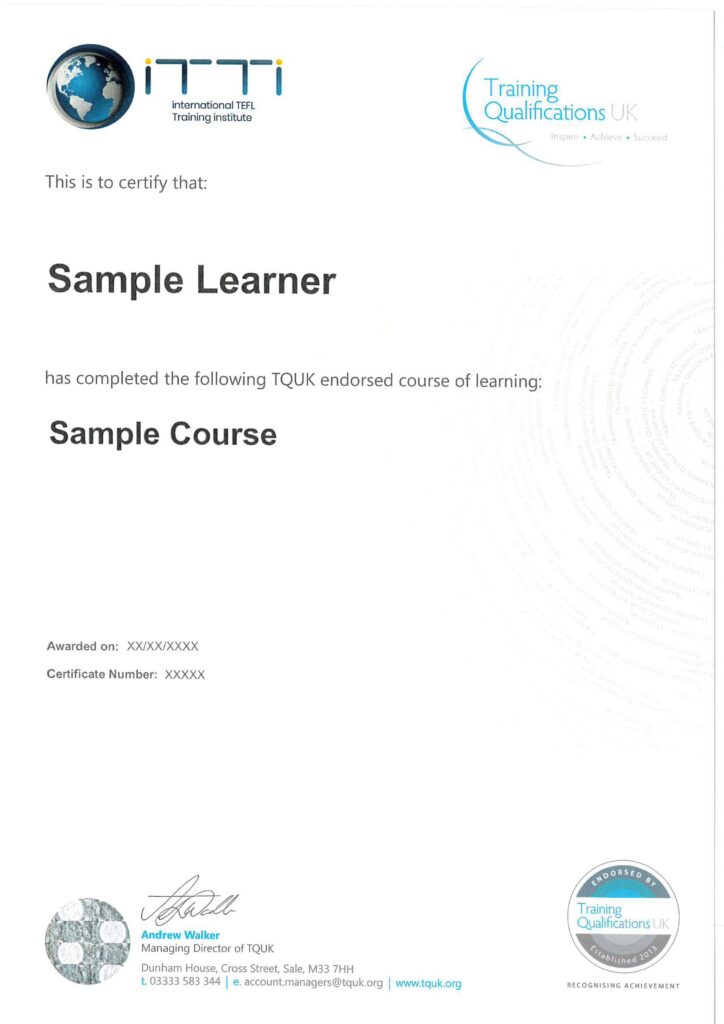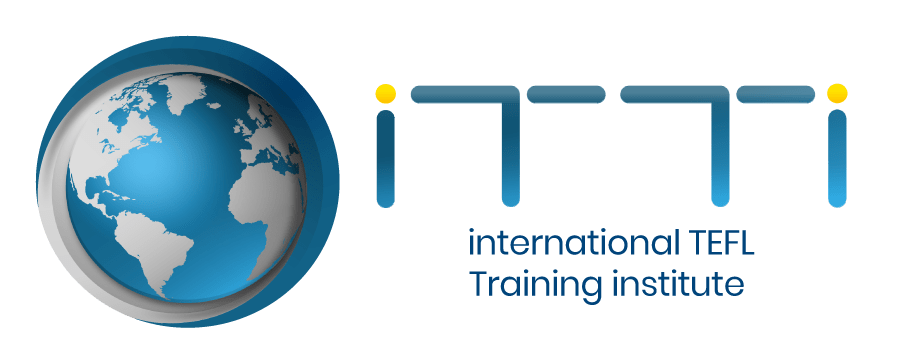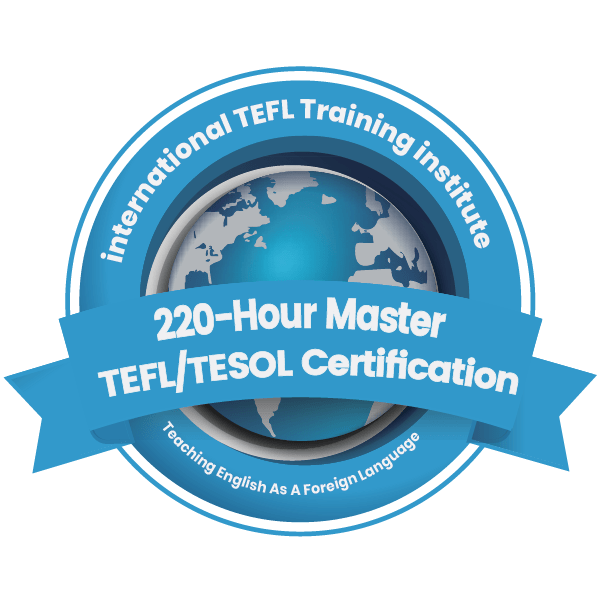• you can take the course from anywhere in the world, and
• our online tuitions are very competitive.
As it is an online TEFL/TESOL course, there is no classroom attendance and no teaching practicum. You will, however, have the opportunity to see actual EFL classes through videos. Throughout the program, you will study the same course content, including a comprehensive grammar review, and design classes just as the onsite program. At the end of the course, you will have learned the following:
• Gain knowledge about past and current EFL teaching methodologies.
• Know how to effectively organize and manage an English class.
• Create high-energy classes every day.
• Acquire know-how of teaching different types of students.
• How to make efficient use of technology in your class.
• Partner with artificial intelligence in your English instruction.
• Understand what is going on inside your English language learners.
• Become an expert in language skill development.
• Turn boring subjects into engaging classes.
• How to correct errors in speech and writing.
• Assessment strategies to achieve accuracy and fluency at the same time.
• Understand how to design business courses and materials.
• Learn how to conduct Business English Classes
• Understand the differences between the adult and the young learner

Sample TQUK Certificate
Prerequisites to registering for this or any other of our courses are an excellent command of both spoken and written English, a high-school diploma as a minimum educational requirement, and 18 years of age.
Let’s Do This!
Start Learning Today!

Master Tesol Certification
Look inside our best Online Tesol Master Course curriculum
Section 1: 120-Hour Standard Teacher Training
- Introduction
- Unit 1: Teachers and Learners
- Unit 2: The English Language
- Unit 3: EFL Methodology – A Journey through History
- Unit 4: Present Tenses
- Unit 5: Successful Classroom Management
- Unit 6: Past Tenses
- Unit 7: Teaching New Language
- Unit 8: Future Tenses
- Unit 9: The Art of Lesson Design
- Unit 10: Teaching & Technology – Making the Match
- Unit 11: Partnering with Artificial Intelligence
- Unit 12: Teaching Listening, Speaking, Reading & Writing
- Unit 13: Teaching Pronunciation & Phonology
- Unit 14: Course Books and Lesson Materials
- Unit 15: Tradition & Innovation in Testing
- Unit 16: Conditionals & Reported Speech
- Unit 17: Equipment and Teaching Aids
- Unit 18: Modals, Phrasal Verbs and Passive Voice
- Unit 19: Teaching Special
- Unit 20: Final lesson design task
- Unit 21: Career Support
Section 2: 50-Hour Teaching Business English
• PART 1: Basic Principles in conducting business English classes.
- Unit 3: The four language acquisition skills and how they are applied to teaching Business English.
- Unit 1: An introduction and overview of English for Specific Purposes (ESP), who your target students are and the process of teaching Business English.
- Unit 2: Methods and approaches to teaching Business English.
- Unit 4: Case studies in which you will have to analyze materials that have already been developed.
- Unit 5: Evaluation and how to evaluate the progress of your students and the course.
• PART 2: Focuses on developing business materials and courses.
- Unit 6: An introduction and an overview on how to develop business materials.
- Unit 7: Adapting business materials.
- Unit 8: Developing business materials.
- Unit 9: Developing business courses.
• PART 3: Bonus Section: Soft skills for Business English. There are no assignments in this section.
- Unit 10: Information on working successfully with business people as students; the importance of incorporating soft skills.
- Unit 11: Idioms.
- Unit 12: Business jargon.
Section 3: 50-Hour Teaching Young Learners
- Unit 1: The Child as a Language Learner
- Unit 2: Teaching Listening to Young Learners
- Quiz: Modules 1 & 2
- Unit 3: Teaching Speaking to Young Learners
- Unit 4: Teaching Reading to Young Learners
- Quiz: Modules 3 & 4
- Unit 5: Teaching Writing to Young Learners
- Unit 6: Teaching Vocabulary to Young Learners
- Quiz: Modules 5 & 6
- Unit 7: Assessing Young Learners
- Unit 8: Working with Parents of Young Learners
- Quiz: Modules 7 & 8
- Unit 9: Key Issues in Teaching Young Learners
- Final Test
- Lesson Plan Assignment
What Our Students Are Saying about TEFL/ TESOL Courses!

MEET iTTi PARTNERS & TRAINERS
FAQs
Master Tesol/ TEFL Certification
You have to be at least 18 years old and have an excellent command of English in both speaking and writing.
Yes, you can. We will test your English. Your level must be C1. B2 may be accepted with proof of additional English classes. Our organization may offer you additional English classes too if required.
Yes, you may. You must talk to an admissions counselor to have this arranged. Please note that the batch will only be released once the course has been paid in full.
The answer is yes. Those schools that don’t require a teaching practicum to obtain a work visa on your behalf will consider you as a candidate for their teaching position.
The tutor will check your assignments as you send them in and provide you with feedback. You also receive two 45-minute sessions with the tutor in order to discuss/practice for you difficult parts of the program. These sessions are by appointment only .
Yes, there are. There are practice quizzes in many units to help you stay on track. There are also final exams in methodology, English grammar, and phonology. You must achieve a minimum score of 70.
We will give you study material. You can retest after one week. The first retesting is free of charge. After that, there is a per-test fee of $35.
Yes, we will. We will assist you in setting up a professional resume/CV. We will provide you with school and/or recruiter information in the destination of your choice.
Not at all. English teachers are high in demand, especially now that many teachers have returned home due to the pandemic. If you study what you must study, you may end up with several job offers.
Yes, you will.
Please specify your request upon registration for the program. We will arrange for that. An additional fee applies.







